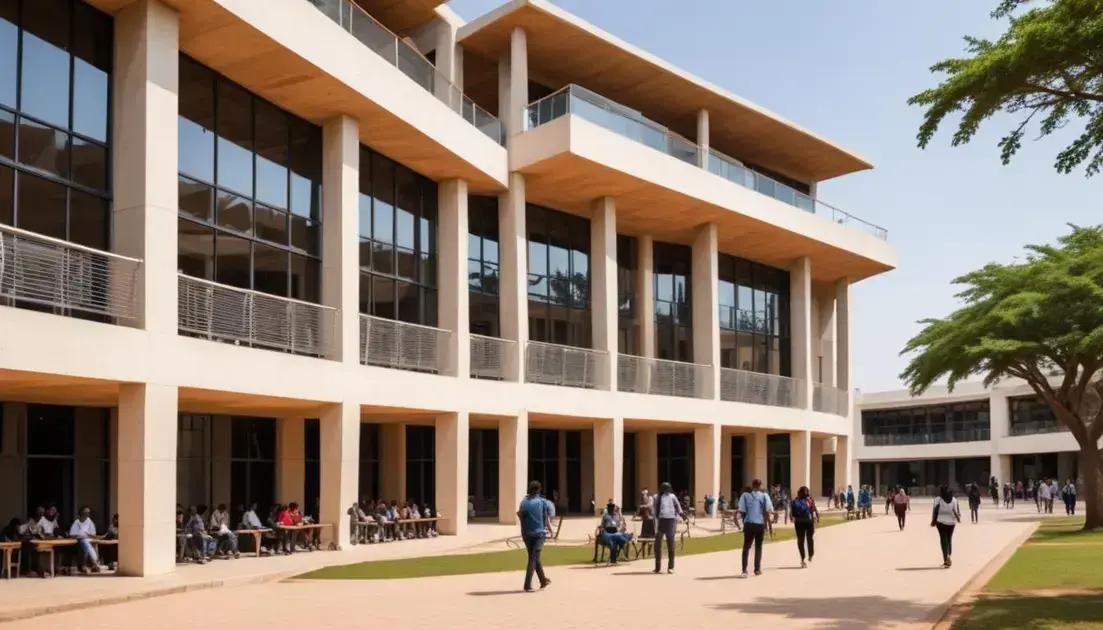UK Universities in Africa: Transforming Educational Landscapes Across the Continent

The landscape of UK universities in Africa is rapidly evolving, presenting a dynamic narrative of international education and cross-continental knowledge exchange. Have you ever wondered how British academic institutions are reshaping educational opportunities across African countries? This exploration reveals a compelling journey of collaboration, innovation, and transformative learning experiences.
Historical context of UK academic presence in Africa
The historical context of UK academic presence in Africa represents a complex narrative deeply rooted in colonial legacies and evolving international educational partnerships. From the early 19th century, British universities began establishing connections with African educational institutions, initially through missionary education and later through more structured academic exchanges.
Colonial Educational Foundations
During the colonial era, British academic institutions played a significant role in shaping educational systems across African territories. Universities like Oxford, Cambridge, and London established scholarship programs and research collaborations that fundamentally influenced educational infrastructure in regions such as Nigeria, Kenya, and South Africa.
Post-Colonial Academic Transformations
After African countries gained independence, UK universities gradually shifted from paternalistic models to more collaborative and equitable partnerships. This transformation involved developing joint research programs, supporting local academic capacity building, and creating transnational education opportunities.
Key milestones included establishing direct university partnerships, supporting curriculum development, and creating research networks that addressed critical regional challenges like healthcare, agriculture, and sustainable development.
Evolving International Academic Dynamics
Contemporary UK-Africa academic relationships are characterized by mutual respect, knowledge exchange, and strategic collaborations. Modern partnerships focus on addressing global challenges, promoting cross-cultural understanding, and developing innovative solutions to complex socio-economic issues.
These evolving connections have transformed from traditional colonial educational models to sophisticated, reciprocal academic exchanges that benefit both British and African institutions.
Emerging educational partnerships between UK and African institutions
Emerging educational partnerships between UK and African institutions are transforming the landscape of international higher education, creating dynamic platforms for knowledge exchange and collaborative innovation. These partnerships extend far beyond traditional academic interactions, embracing comprehensive strategies that address regional development challenges.
Strategic Collaborative Models
Institutional partnerships now focus on co-developing curricula, joint research programs, and capacity-building initiatives. Universities like University College London, University of Edinburgh, and Imperial College have pioneered comprehensive engagement models that prioritize mutual academic growth and knowledge transfer.
Research and Innovation Frameworks
Modern partnerships emphasize collaborative research addressing critical African challenges. These include sustainable agriculture, healthcare solutions, technological innovation, and climate adaptation strategies. UK institutions provide advanced research infrastructure and methodological expertise, while African universities contribute contextual understanding and localized insights.
Student and Faculty Exchange Programs
Emerging partnership models now include robust student and faculty exchange programs. These initiatives enable cross-cultural learning, provide international exposure, and create networks of academic professionals committed to addressing global challenges. Scholarships, research grants, and joint doctoral programs have become key mechanisms for fostering these connections.
Digital technologies and virtual collaboration platforms have further expanded these partnerships, enabling real-time knowledge sharing and reducing geographical barriers. Online workshops, joint virtual conferences, and collaborative digital research tools are increasingly complementing traditional academic exchanges.
Technology Transfer and Capacity Building
UK institutions are increasingly focusing on technology transfer and comprehensive capacity-building programs. This involves supporting African universities in developing advanced research capabilities, upgrading technological infrastructure, and creating sustainable academic ecosystems that can drive regional innovation and economic development.
Impact of UK universities on African higher education development
The impact of UK universities on African higher education development represents a multifaceted transformation that extends beyond traditional academic boundaries. These institutions have played a crucial role in reshaping educational infrastructure, research capabilities, and professional development across the African continent.
Curriculum Innovation and Academic Standards
UK universities have significantly contributed to modernizing academic curricula and establishing rigorous educational standards in African institutions. By sharing advanced pedagogical approaches, introducing contemporary learning methodologies, and developing comprehensive educational frameworks, British academic institutions have helped elevate the quality of higher education across various African countries.
Research Capacity and Knowledge Transfer
Through strategic partnerships, UK universities have enabled substantial research capacity building in African academic environments. Joint research programs, collaborative doctoral training, and knowledge transfer initiatives have empowered local researchers and institutions to develop sophisticated research infrastructures. These efforts have been particularly impactful in fields like healthcare, agricultural sciences, technology, and sustainable development.
Professional Skills Development
UK universities have played a critical role in enhancing professional skills development across African educational ecosystems. By introducing international benchmark standards, providing specialized training programs, and creating opportunities for skill acquisition, these institutions have helped prepare African graduates for global professional challenges.
Digital learning platforms, online certification programs, and virtual exchange initiatives have further expanded the reach and impact of UK educational interventions, breaking down geographical barriers and creating accessible learning opportunities.
Institutional Governance and Management
Beyond academic content, UK universities have significantly influenced institutional governance models in African higher education. Sharing best practices in academic administration, research management, and institutional leadership has helped African universities develop more robust, transparent, and efficient organizational structures.
key collaborative research and academic exchange programs
Key collaborative research and academic exchange programs between UK and African institutions represent a transformative approach to international academic cooperation. These initiatives go beyond traditional educational models, creating dynamic platforms for knowledge sharing and innovative problem-solving.
Interdisciplinary Research Collaborations
Strategic research partnerships have emerged across diverse scientific domains, focusing on critical challenges facing African nations. Programs like the UK-Africa Universities Partnership and Newton Fund have facilitated groundbreaking collaborative projects in areas such as climate change, public health, agricultural sustainability, and technological innovation.
Doctoral and Postdoctoral Exchange Mechanisms
Advanced academic exchange programs have developed sophisticated mechanisms for supporting doctoral and postdoctoral researchers. These initiatives provide comprehensive funding, research infrastructure, and cross-cultural learning opportunities. Scholars can access cutting-edge facilities, participate in joint research projects, and develop international professional networks that transcend traditional academic boundaries.
Digital and Virtual Collaboration Platforms
Technological advancements have revolutionized academic exchange programs. Virtual research workshops, online collaborative platforms, and digital conference series have expanded opportunities for continuous knowledge exchange. These digital tools enable real-time collaboration, reducing geographical limitations and creating more inclusive academic environments.
Specialized research grants, joint publication programs, and collaborative funding mechanisms have further strengthened these academic partnerships. Universities leverage their complementary strengths to address complex global challenges and generate innovative solutions.
Sector-Specific Research Initiatives
Targeted exchange programs have developed sector-specific research initiatives addressing critical regional development needs. From renewable energy technologies to healthcare innovations, these collaborations focus on creating practical, implementable solutions that directly benefit local communities and contribute to broader scientific knowledge.
Challenges and opportunities in transnational education

Transnational education represents a complex landscape of interconnected challenges and unprecedented opportunities for academic institutions seeking global engagement. These dynamic interactions require innovative approaches and strategic planning.
Regulatory and Accreditation Complexities
Navigating diverse educational regulations across different national contexts presents significant challenges. Universities must develop robust compliance strategies, understand complex accreditation requirements, and create flexible academic frameworks that meet international standards while maintaining educational integrity.
Cultural and Pedagogical Adaptation
Successful transnational education demands profound cultural intelligence and pedagogical flexibility. Institutions must design curricula that respect local educational contexts, integrate diverse learning perspectives, and create inclusive academic environments that transcend traditional cultural boundaries.
Technological Infrastructure Challenges
Digital platforms have transformed transnational education, but significant technological disparities exist between different regions. Addressing infrastructure limitations, ensuring reliable connectivity, and developing adaptive digital learning tools are critical for creating effective international educational experiences.
Emerging technologies like virtual reality, artificial intelligence, and collaborative online platforms are reshaping how universities approach cross-border educational interactions, creating more dynamic and accessible learning environments.
Economic and Funding Considerations
Financial sustainability remains a crucial challenge in transnational education. Universities must develop innovative funding models, explore strategic partnerships, and create scalable educational programs that balance academic quality with economic feasibility. Scholarships, joint funding initiatives, and collaborative research grants play increasingly important roles in supporting these complex academic exchanges.
Innovative learning models and curriculum adaptations
Innovative learning models and curriculum adaptations represent a critical evolution in higher education, particularly in the context of UK universities’ engagement with African academic institutions. These transformative approaches are reshaping traditional educational paradigms.
Hybrid and Flexible Learning Frameworks
Digital technologies have enabled the development of sophisticated hybrid learning models that blend online and in-person educational experiences. These adaptive frameworks allow students to access high-quality educational content regardless of geographical limitations, providing unprecedented flexibility and accessibility.
Problem-Based and Contextual Learning
Contemporary curriculum designs are increasingly focusing on problem-based learning approaches that directly address regional challenges. By integrating real-world problem-solving scenarios, universities are creating more relevant and impactful educational experiences that prepare students for complex professional environments.
Interdisciplinary Curriculum Design
Modern academic programs are breaking down traditional disciplinary boundaries. Innovative curricula now emphasize interconnected learning approaches, encouraging students to develop comprehensive skill sets that transcend single-discipline constraints. This approach enables more holistic understanding and prepares graduates for multifaceted professional challenges.
Emerging technologies like artificial intelligence, virtual reality, and interactive simulation platforms are being integrated into learning models, creating immersive and engaging educational experiences that enhance student participation and knowledge retention.
Personalized Learning Pathways
Adaptive learning technologies now enable more personalized educational experiences. By utilizing data analytics and artificial intelligence, universities can create customized learning pathways that respond to individual student needs, learning styles, and professional aspirations. This approach maximizes educational effectiveness and student engagement.
Economic and social benefits of international university connections
International university connections generate profound economic and social benefits that extend far beyond traditional academic boundaries. These global partnerships create multilayered impacts across educational, economic, and societal domains.
Knowledge Economy Development
Strategic university collaborations directly contribute to developing robust knowledge economies. By facilitating technology transfer, research innovation, and skill development, these international connections help African nations build sophisticated human capital infrastructures that attract global investments and entrepreneurial opportunities.
Skill Transformation and Workforce Readiness
International academic partnerships play a crucial role in transforming local workforce capabilities through advanced skill training and global competency development. Students gain access to cutting-edge curriculum, international exposure, and professional networks that significantly enhance their employability and economic mobility.
Research and Innovation Ecosystems
Collaborative university connections foster dynamic research and innovation ecosystems. By creating platforms for knowledge exchange, joint research initiatives, and technology transfer, these partnerships generate practical solutions to complex regional challenges in sectors like healthcare, agriculture, and sustainable development.
Digital technologies and virtual collaboration platforms have expanded the reach and impact of these international academic connections, enabling continuous knowledge flow and reducing geographical limitations.
Social Transformation and Cultural Understanding
Beyond economic metrics, international university connections drive profound social transformations. They promote cross-cultural understanding, build global citizenship perspectives, and create networks of professionals committed to addressing shared global challenges. These interactions help break down cultural barriers and generate more inclusive, collaborative approaches to complex societal issues.
Future prospects of UK-African academic collaborations
Future prospects of UK-African academic collaborations represent a dynamic and evolving landscape of international educational partnerships. These emerging opportunities promise transformative potential for both regions.
Technological Innovation and Digital Transformation
Next-generation collaborations will focus on leveraging advanced technological platforms and digital innovation ecosystems. Artificial intelligence, blockchain technologies, and sophisticated data analytics will become central mechanisms for creating more responsive and adaptive academic exchanges between UK and African institutions.
Sustainable Development Research Networks
Future academic partnerships will prioritize collaborative research addressing critical global challenges. Climate adaptation, renewable energy solutions, healthcare infrastructure, and agricultural sustainability will emerge as key focal points for joint research initiatives. These networks will create practical, scalable solutions with significant regional and global impact.
Comprehensive Skill Development Platforms
Emerging collaboration models will develop comprehensive, flexible skill development platforms. Virtual learning environments, micro-credentialing systems, and adaptive online training programs will enable more accessible, personalized educational experiences that transcend traditional geographical and institutional boundaries.
Emerging technologies like augmented reality, artificial intelligence, and immersive learning platforms will revolutionize how academic collaborations are conceptualized and implemented, creating more dynamic and interactive educational experiences.
Policy and Institutional Transformation
Future UK-African academic collaborations will require sophisticated policy frameworks and institutional adaptations. Universities will need to develop more agile governance models, create flexible accreditation mechanisms, and foster environments that support continuous innovation and cross-cultural knowledge exchange.
Transforming Global Education: The UK-Africa Academic Partnership Journey
The evolving landscape of UK-African academic collaborations represents more than just an educational exchange – it’s a profound journey of mutual growth, innovation, and shared potential. These international partnerships are rewriting the narrative of global knowledge creation, moving beyond traditional colonial educational models towards truly collaborative, dynamic learning ecosystems.
By embracing technological innovation, addressing complex global challenges, and creating flexible, adaptive educational frameworks, UK and African universities are building bridges that transcend geographical, cultural, and institutional boundaries. The future of these collaborations promises not just academic excellence, but a transformative approach to solving critical regional and global issues.
As we look forward, these academic connections will continue to play a crucial role in developing human capital, driving technological innovation, and creating sustainable solutions that benefit both regions. The journey of UK-African academic partnerships is a testament to the power of international cooperation, shared knowledge, and the unlimited potential of collaborative learning.





